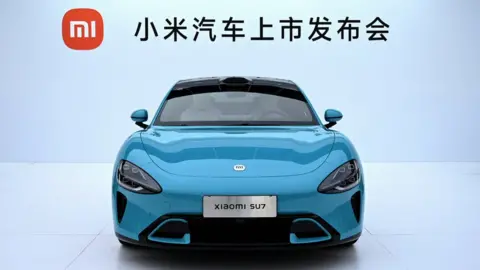Xiaomi: Chinese smartphone giant takes on Tesla
 Getty Images
Getty ImagesChinese smartphone maker Xiaomi has launched its first electric vehicle (EV) and started taking orders.
At the event the technology giant's chief executive Lei Jun said the standard SU7 model would be priced at 215,900 yuan ($29,872; £23,663) and the Max version would cost 299,900 yuan.
The firm says it got over 50,000 orders within the first 27 minutes of sales.
Xiaomi's entry into the electric car market comes as sales growth has slowed globally, triggering a price war.
The move sees the technology giant taking on EV rivals including Tesla and BYD. The starting price in China for Tesla's Model 3 is 245,900 yuan.
Mr Lei also said the SU7 would have a minimum range of 700km (435 miles), beating the Tesla Model 3's 567km.
The firm is hoping that the SU7's shared operating system with its phones, laptops and other devices will appeal to existing customers.
Xiaomi is the third-largest seller of smartphones worldwide with a market share of about 12%, according to research firm Counterpoint.
The SU7, which Xiaomi has been teasing since last year, has drawn comparisons to Porsche's Taycan and Panamera sports car models.
It will be made by a unit of state-owned car manufacturer BAIC Group at a plant in Beijing that can produce as many as 200,000 vehicles a year.
"While getting this far is itself quite an achievement, the ultimate achievement would be to demonstrate that there is a consumer market for Xiaomi as a smart EVs brand," Bill Russo of Automobility told the BBC.
In an indication of the challenges facing technology firms who want to make electric cars, iPhone maker Apple last month reportedly cancelled its plans to build an EV.
Mr Russo added that Xiaomi's entry into the car market reflected its confidence "in the relevancy for their brand" in China while Apple did not see enough potential in the EV market outside of China.
Xiaomi has said it will invest $10bn (£7.9bn) in its vehicles business over the next 10 years.
"The Chinese EV market is very mature and creates a very stable ecosystem for the EV manufacturers," said Abhishek Murali from research firm Rystad Energy.
"For example, the battery supply chain is very strong, and the charging network in the country is also growing to meet the growing EV feed."
The launch of Xiaomi's first car comes as a price war in China's EV market has been intensifying.
Tesla, which is headed by multi-billionaire Elon Musk, has cut the cost of its cars in China by thousands of dollars in recent months as local rivals like the world's top-selling EV maker BYD have slashed prices.
The world's biggest car market is already crowded so Xiaomi is one of the few new prospective entrants to gain approval from authorities as officials try to curb a flood of new players.
Earlier this week, BYD posted record annual profits but said growth had slowed towards the end of last year.
Shanghai-based electric car maker Nio on Wednesday lowered its forecast for first quarter deliveries as consumers tightened spending as China's economic growth weakens.
American EV giant Tesla is due to announce its delivery numbers for the first three months of 2024 next week.
At the same time, governments around the world are pushing back against imports of foreign-made EVs.
On Tuesday, Beijing initiated dispute settlement proceedings against the US at the World Trade Organization to contest "discriminatory subsidies" under the US Inflation Reduction Act.
Meanwhile, the European Union has launched an investigation into whether Chinese government subsidies have helped the country's electric car makers undercut European-made models.
